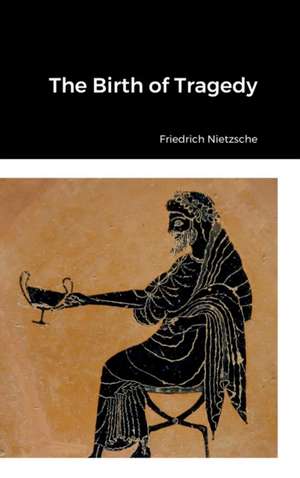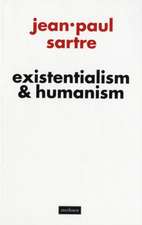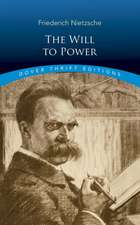The Birth of Tragedy
Autor Friedrich Nietzscheen Limba Engleză Hardback – 28 mai 2022
| Toate formatele și edițiile | Preț | Express |
|---|---|---|
| Paperback (5) | 46.46 lei 24-30 zile | +14.86 lei 5-11 zile |
| Penguin Books – 26 mai 1993 | 46.46 lei 24-30 zile | +14.86 lei 5-11 zile |
| Oxford University Press – 12 iun 2008 | 47.19 lei 10-16 zile | +16.06 lei 5-11 zile |
| Neeland Media – 12 iun 2018 | 59.82 lei 6-8 săpt. | |
| Lulu.Com – 28 mai 2022 | 93.28 lei 6-8 săpt. | |
| Kessinger Publishing – 17 iun 2004 | 115.10 lei 38-44 zile | |
| Hardback (2) | 177.81 lei 38-44 zile | |
| NuVision Publications – 5 feb 2009 | 177.81 lei 38-44 zile | |
| Lulu.Com – 28 mai 2022 | 184.94 lei 6-8 săpt. |
Preț: 184.94 lei
Nou
Puncte Express: 277
Preț estimativ în valută:
35.39€ • 37.04$ • 29.45£
35.39€ • 37.04$ • 29.45£
Carte tipărită la comandă
Livrare economică 31 martie-14 aprilie
Preluare comenzi: 021 569.72.76
Specificații
ISBN-13: 9781387917938
ISBN-10: 1387917935
Pagini: 142
Dimensiuni: 157 x 235 x 12 mm
Greutate: 0.36 kg
Editura: Lulu.Com
ISBN-10: 1387917935
Pagini: 142
Dimensiuni: 157 x 235 x 12 mm
Greutate: 0.36 kg
Editura: Lulu.Com
Notă biografică
1844-1900. German philologist, philosopher, cultural critic, poet and composer. He wrote several critical texts on religion, morality, contemporary culture, philosophy and science, displaying a fondness for metaphor, irony and aphorism. Nietzsche began his career as a classical philologist - a scholar of Greek and Roman textual criticism - before turning to philosophy. In 1869, at age twenty-four, he was appointed to the Chair of Classical Philology at the University of Basel, the youngest individual to have held this position. He resigned in the summer of 1879 due to health problems that plagued him most of his life. In 1889, at age forty-four, he suffered a collapse and a complete loss of his mental faculties. The breakdown was later ascribed to atypical general paresis due to tertiary syphilis, but this diagnosis has come into question. Nietzsche lived his remaining years in the care of his mother until her death in 1897, after which he fell under the care of his sister Elisabeth Förster-Nietzsche until his death in 1900. The Free Dictionary
Cuprins
Descriere
Descriere de la o altă ediție sau format:
'Yes, what is Dionysian? - This book provides an answer - "a man who knows" speaks in it, the initiate and disciple of his god.'The Birth of Tragedy (1872) is a book about the origins of Greek tragedy and its relevance to the German culture of its time. For Nietzsche, Greek tragedy is the expression of a culture which has achieved a delicate but powerful balance between Dionysian insight into the chaos and suffering which underlies all existence and the discipline and clarity of rational Apollonian form. In order to promote a return to these values, Nietzsche undertakes a critique of the complacent rationalism of late nineteenth-century German culture and makes an impassioned plea for the regenerative potential of the music of Wagner. In its wide-ranging discussion of the nature of art, science and religion, Nietzsche's argument raises important questions about the problematic nature of cultural origins which are still of concern today. ABOUT THE SERIES: For over 100 years Oxford World's Classics has made available the widest range of literature from around the globe. Each affordable volume reflects Oxford's commitment to scholarship, providing the most accurate text plus a wealth of other valuable features, including expert introductions by leading authorities, helpful notes to clarify the text, up-to-date bibliographies for further study, and much more.
'Yes, what is Dionysian? - This book provides an answer - "a man who knows" speaks in it, the initiate and disciple of his god.'The Birth of Tragedy (1872) is a book about the origins of Greek tragedy and its relevance to the German culture of its time. For Nietzsche, Greek tragedy is the expression of a culture which has achieved a delicate but powerful balance between Dionysian insight into the chaos and suffering which underlies all existence and the discipline and clarity of rational Apollonian form. In order to promote a return to these values, Nietzsche undertakes a critique of the complacent rationalism of late nineteenth-century German culture and makes an impassioned plea for the regenerative potential of the music of Wagner. In its wide-ranging discussion of the nature of art, science and religion, Nietzsche's argument raises important questions about the problematic nature of cultural origins which are still of concern today. ABOUT THE SERIES: For over 100 years Oxford World's Classics has made available the widest range of literature from around the globe. Each affordable volume reflects Oxford's commitment to scholarship, providing the most accurate text plus a wealth of other valuable features, including expert introductions by leading authorities, helpful notes to clarify the text, up-to-date bibliographies for further study, and much more.





















